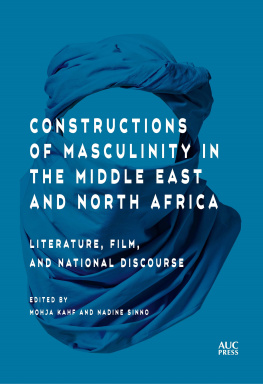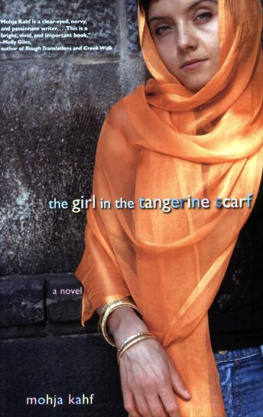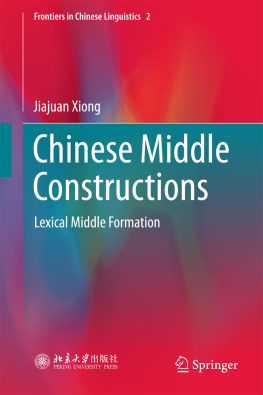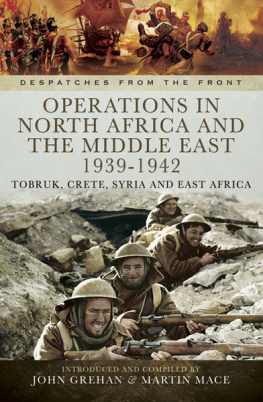CONSTRUCTIONS OF MASCULINITY IN THE MIDDLE EAST AND NORTH AFRICA
CONSTRUCTIONS OF MASCULINITY IN THE MIDDLE EAST AND NORTH AFRICA
LITERATURE, FILM, AND NATIONAL DISCOURSE
EDITED BY
MOHJA KAHF AND NADINE SINNO
The American University in Cairo Press
Cairo New York
This electronic edition published in 2021 by
The American University in Cairo Press
113 Sharia Kasr el Aini, Cairo, Egypt
One Rockefeller Plaza, New York, NY 10020
www.aucpress.com
Copyright 2021 by The American University in Cairo Press
All rights reserved. No part of this publication may be reproduced, stored in a retrieval system, or transmitted in any form or by any means, electronic, mechanical, photocopying, recording, or otherwise, without the prior written permission of the publisher.
ISBN 978 977 416 975 5
eISBN 978 164 903 015 3
Version 1
CONTENTS
Mohja Kahf
Jedidiah Anderson
Amal Amireh
Nadine Sinno
Kifah Hanna
Robert James Farley
Nicole Fares
Alessandro Columbu
John Tofik Karam
Kaveh Bassiri
Nouri Gana
Sarah Hudson
Matthew B. Parnell
Kathryn Kalemkerian
Oyman Basaran
Andrea Fischer-Tahir
Ebtihal Mahadeen
FIGURES
Chapter 1
Chapter 12
ACKNOWLEDGMENTS
S pecial thanks to contributor Nicole Fares for initiating the conversation on constructing masculinities by organizing a Middle East Studies Association (MESA) panel in 2016, as well as for sending out the initial call for papers, reviewing early abstracts, and identifying existing works on masculinitiesand for believing in this book project from the start.
NOTES ON CONTRIBUTORS
Amal Amireh is an associate professor of English at George Mason University. She received her BA from Birzeit University and her PhD in English and American Literature from Boston University. She is the author of The Factory Girl and the Seamstress: Imagining Gender and Class in Nineteenth-Century American Fiction, and is co-editor of Going Global: The Transnational Reception of Third World Women Writers and Etel Adnan: Critical Essays on the Arab-American Writer and Artist. Her essays have appeared in many publications and some have been translated into Arabic and Farsi. Her current research focuses on Palestinian literature, gender, sexuality, and nationalism.
Jedidiah Anderson attended the University of Pittsburgh where he received a BA in Japanese and Linguistics. Upon graduation, Anderson joined the U.S. Army, serving as an Arabic linguist in Mosul, Rawah, and Baghdad, Iraq. After achieving the rank of sergeant and being honorably discharged, he attended the American University of Beirut in Lebanon, where he earned a masters degree in Middle Eastern Studies, focusing on gender and sexuality in the Middle East. For his PhD, Anderson attended Indiana University Bloomington. His research focused on LGBTQI activism in Lebanon, Iraq, and Israel/Palestine, and on the cultural history of the Arab world and minorities in the region from 1850 to the present day. After spending a year doing fieldwork in those countries, Anderson returned to the United States and did a postdoc at Wofford College. He joined the faculty at Furman University in 2017. His book based on his dissertationtentatively titled Sexual Intifada Now!has been accepted for publication with Indiana University Press.
Oyman Basaran is an assistant professor of sociology at Bowdoin College. His research specialties are in Sociology of Medicine and Health, Economic Sociology, and Political Sociology. Currently, he is working on a book project that examines the discursive, organizational, and institutional transformations of the market for male circumcision from the 1920s until the present in Turkey.
Kaveh Bassiri is a writer, translator, and PhD candidate in Comparative Literature at the University of Arkansas, where he has taught a range of Iranian literature and film courses. His essays have been published in Iranian Studies, the Journal of Middle East Womens Studies, the Michigan Quarterly Review, Film International, and Senses of Cinema.
Alessandro Columbu completed his PhD in Modern Arabic Literature at the University of Edinburgh in 2017, and is currently Lecturer in Arabic at The University of Westminster, London. Originally from Sardinia, he obtained his BA and MA from the University of Bologna. He learned Arabic in Damascus and Tunis, and has studied at the University of Barcelona, SOAS University of London, and the French Institute of the Near East in Beirut and Amman. His translation of Zakariya Tamirs Taksir rukab, published in October 2015 by Condaghes, was the first book to have ever been translated from Arabic into Sardinian.
Nicole Fares is a translator, writer, and educator. Her works have been published in journals and magazines across the United States. She has obtained a PhD in Comparative Literature and Cultural Studies from the University of Arkansas (Spring 2018), and her recent research centers on the LGBTQI communities in the Middle East and North Africa (MENA), Europe, and North America following the Syrian Civil War and the subsequent refugee crises. She is currently translating her third novel from Arabic into English.
Robert James Farley works at the interstices of Arabic, queer, and translation studies as a PhD candidate in Comparative Literature at the University of California, Los Angeles (UCLA), where he is writing a dissertation on grassroots productions of a language and archive of gender and sexuality in Arabic-language digital periodicals across the Mashriq and Maghrib. He teaches courses at UCLA on postcolonial literatures, and works as a research and instructional technology consultant in the digital humanities. Farley has presented his work at annual meetings of the National Womens Studies Association and the American Comparative Literature Association, and some of his translations can be found in Banipal magazine.
Andrea Fischer-Tahir (PhD) specializes in Kurdish Studies. She has conducted extensive field research on issues such as political history, gender, media, and urbanrural dynamics. She worked at Koye University Kurdistan; the Zentrum Moderner Orient, Berlin; and Philipps University of Marburg. Her dissertation discussed martyrdom, mobilization, and memory in Kurdistan. She is the author of Brave Men, Pretty Women? Gender and Symbolic Violence in Iraqi Kurdish Urban Society (2009), and co-editor of Peripheralization: Spatial Differentiation and Social Injustice (2013) and Disciplinary Spaces: Spatial Control, Forced Assimilation, and Narratives of Progress since the 19th Century (2017).
Nouri Gana is professor of Comparative Literature, and Near Eastern Languages and Cultures at UCLA. He has published numerous articles and chapters on the literatures and cultures of the Arab world and its diasporas in such scholarly venues as Cultural Politics, PMLA, Public Culture, and Social Text. He is the author of Signifying Loss: Toward a Poetics of Narrative Mourning, and the editor of The Making of the Tunisian Revolution: Contexts, Architects, Prospects







